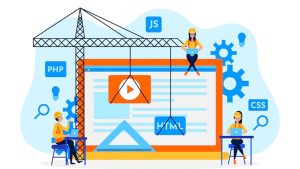How long it takes to become a software Engineers: Software development is a highly rewarding and lucrative career that involves designing, developing, and maintaining software applications. With the increasing demand for software developers in the modern world, many people are interested in learning this skill.
However, one question that many aspiring developers ask is how long it takes to learn software development.The answer to this question varies based on various factors such as the individual’s learning style, motivation, prior knowledge and experience, available resources, and the complexity of the software development area they are interested in .
This article will take you through how long it takes to become a software Engineers as well as how you can become one.
Recommended: How To Introduce Yourself During An Interview
How long it takes to become a software Engineers
Becoming a software engineer is a popular career choice for many people, but the time it takes to become one can vary depending on individual circumstances. Generally speaking, it takes several years of education and practical experience to become a competent software engineer.
To start, A bachelor’s degree in computer science or a closely related subject is usually necessary to start out as a software engineer. The average time to earn this degree is four years, though some schools may require more time.
A master’s degree or other form of advanced education may also be pursued by some software engineers in order to increase their knowledge and abilities.
In addition to formal education, practical experience is also important for software engineers. Many aspiring software engineers participate in internships or co-op programs while in school to gain hands-on experience in the field.
Additionally, many software engineers work on personal projects or contribute to open-source projects to build their skills.Overall, becoming a competent software engineer can take anywhere from four to six years of formal education and practical experience.
However, the learning process never truly ends in this field, as software engineers must constantly adapt to new technologies and trends to remain competitive in the job market.
As such, ongoing education and professional development are important for software engineers throughout their careers.
How to become a software Engineer
To learn software development, one must first understand what software development is and what it entails. Software development is a broad field that involves various subfields such as web development, mobile app development, game development, software engineering, and data science.
See Also: Differences Between Note Taking and Note Making
Each subfield requires different skills and knowledge, and the time it takes to learn each of them varies. Below are steps involved in learning software engineering;
1. Choose a niche: The first step to learning software development is to choose a subfield that you are interested in and start learning the basics.

The basics of software development include database management, programming languages, algorithms, and data structures.
Before moving on to more advanced subjects, these concepts must be mastered because they are the cornerstone of all aspects of software development.
2. Learn a programing language: Picking a programming language and learning it completely is the next stage. Each programming language has advantages and disadvantages, and there are many to choose from.

Some programming languages, however, are more well-known and frequently used than others. For instance, learning any of the widely used programming languages—like Python, C++, and Java—can be a wonderful place to start.
Learning a programming language requires consistent practice and dedication. You can start by reading online tutorials, watching video tutorials, and practicing coding exercises.
You can also enroll in online courses, attend coding bootcamps, or take university courses to learn a programming language.
Must Read: Most Protected People In The World 2023
3. Learn other advanced related fields: Once you have learned a programming language, you can move on to more advanced topics such as software design, algorithms, and data structures.

These concepts are crucial for developing high-quality software applications that are efficient, scalable, and maintainable. To learn software design, you need to understand software architecture patterns, design principles, and best practices.
You also need to learn how to use design tools such as UML diagrams, flowcharts, and wireframes. You can learn software design by reading books, attending workshops, and practicing software design exercises.
In software development, algorithms and data structures are crucial for resolving complicated issues. Data structures are methods for organizing and storing data, whereas algorithms are sets of instructions that teach a computer how to solve a specific issue.
By reading books and web articles, participating in coding competitions and hackathons, and doing coding exercises, you can learn algorithms and data structures.
4. Start building software applications: After learning the basics of software development and a programming language, you can start building software applications. Building software applications is an excellent way to practice and apply the concepts you have learned.

You can start by building simple applications and gradually move on to more complex ones. Building software applications requires a good understanding of the software development process.
The software development process involves various stages such as planning, analysis, design, implementation, testing, and deployment.
You can learn the software development process by reading books, attending workshops, and practicing with real-world software development projects. To become a proficient software developer, you need to continuously learn and improve your skills.
Software development is a rapidly changing field, and new technologies and tools emerge regularly. Therefore, you must stay up-to-date with the latest trends and developments in the field.
See Also: Weakest Animals In The World
5. Build Your Portfolio: Employers often look for candidates who have experience working on projects outside of the classroom.

Building a portfolio of projects can demonstrate your skills and experience in software development. This can include personal projects, open-source contributions, or internships.
6. Look for Job Opportunities: Once you have the education and skills required to become a software engineer, it’s time to start looking for job opportunities.

Make sure to tailor your resume and cover letter to each job you apply for, and do your research on companies that share your interests and values.
7. Pursue Professional Development: It’s critical to seek professional development on a regular basis to maintain your competitiveness in the job market.
To remain current with the newest technologies and trends in software development, attend conferences and seminars. To advance your schooling, you might think about getting a master’s degree in computer science or a related
subject.
8. Network with other software engineers: Networking with other software engineers can provide valuable insights, job opportunities, and mentorship.
Attend conferences, join online communities, or participate in hackathons to meet other professionals in the field.
See Also: How To Prepare For A Speech Presentation
Conclusion: In summary, learning software development is a long-term process that requires consistent practice, dedication, and a passion for learning. The time it takes to learn software development varies depending on various factors such as the individual’s learning style, motivation, previous knowledge and experience, available resources, and the complexity of the software development area they are interested in.
However, with consistent practice and dedication, one can become a proficient software developer within six months to two years.To learn software development, one must first understand the basics of software development, choose a programming language, and learn it thoroughly.
Then, one can move on to more advanced topics such as software design, algorithms, and data structures. Building software applications is an excellent way to practice and apply the concepts you have learned. Continuous learning and improvement are crucial for becoming a proficient software developer

Edeh Samuel Chukwuemeka, ACMC, is a lawyer and a certified mediator/conciliator in Nigeria. He is also a developer with knowledge in various programming languages. Samuel is determined to leverage his skills in technology, SEO, and legal practice to revolutionize the legal profession worldwide by creating web and mobile applications that simplify legal research. Sam is also passionate about educating and providing valuable information to people.